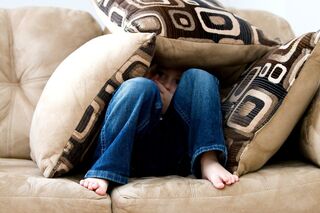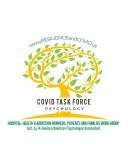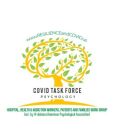Coronavirus Disease 2019
COVID-19 Overwhelm: Self-Care for Abuse Survivors
Cultivating self-care can ease the burden of anxiety triggered by unsafe times.
Posted February 5, 2021
This post was written by Denise Bossarte.
The COVID-19 pandemic has impacted all of our lives in the past year. But for me, as a survivor of childhood sexual abuse, it has been one of the most trying times of my adult life.
As a child, the abuse taught me that the world was a dangerous place, that I had little control over protecting myself, that people were dangerous and could hurt you deeply (even the ones in your family), and it instilled in me a deep, basic shame about my very being.
I have worked very hard in my adulthood to find the practices and activities that helped me heal and stay resilient: therapy, yoga, meditation, doing creative things, being in nature, finding community. And I felt I had made it to a place of thriving. But COVID19 kicked me in the gut and knocked me right off my feet.

For me, part of the impact of COVID-19 is the fact that my husband is in six major risk areas. I’m constantly worried about protecting him from what exposure I might have by going to work or even something as simple as shopping at the grocery store. We follow all the guidelines, but I was feeling so overwhelmed I just wanted to hide from the world.
And as the overwhelm continued to build, I started shaming myself with thoughts about what I should be doing, how I should be handling things, how I should be dealing with my emotions; the shoulds just kept coming.
Discovering the Root of My Fear and Anxiety
When I started looking more deeply at my feelings, I realized I was being triggered back to those emotions I felt as an abused child. And despite all the work I’ve done, there was a part of me that was swept away by those old feelings of being out of control and unsafe.
I started asking myself what I could be doing instead of what my self-critic thought I should be doing. I encouraged myself to step into a place of self-compassion and self-care, treating and encouraging myself as I would for a dear friend or beloved family member who was suffering as I was.
Questions to Help Identify Self-Care Practices Right for You
See if you can tap into your own self-compassion and self-care, as I did, with the following questions:
- Can I stop shaming myself with “shoulds” and focus on the “coulds” I can do for myself?
- How can I deal with these feelings of overwhelm directly at the moment they are occurring?
For me, the simple act of taking several deep breaths helps bring a sense of ease and calm.
Research shows that when you focus on the exhale being slightly longer than the inhale, deep breaths activate your parasympathetic nervous system. This is the part of your nervous system that is responsible for restoring the body to a calm and restful state. You can mindfully tap into your body’s natural processes with minimal effort by bringing your attention to your breath.
And when I cannot shift my overwhelm with deep breahing, I will place my hand over my heart and gently rub small circles. While rubbing, I will say to myself “I’m OK, I’m OK,” repeating the phrase to myself silently. Sometimes I will imagine a dear friend speaking to me, saying “you're OK, you're OK” and supporting me. It gets me centered back into my body rather than my head and gets me present in the here and now rather than focusing on the what ifs of the future.

Other research-backed ideas you can try that help with feelings of overwhelm might be thinking of someone who cares for you, imagining them being there with you to give you a hug or hold your hand. It could be repeating the favorite line of a song, or an inspirational quote that buoys you. Or thinking of a place where you feel safe and at peace. Or imagining how it feels being with your favorite pet.
The idea is to find something that is simple to bring to mind when your fear flares up. To identify what works for you and practice it so it is easy to do when the fear strikes.
- What can I do on a regular basis to reduce my sense of overwhelm and build my resilience?
This is where self-care really comes into play!
For me, I de-stress in a number of ways.
- I listen to inspiring podcasts, guided meditations, and soothing music.
- I do yoga and get outside for walks to grab a bit of sunshine.
- I read interesting and fun books. I watch uplifting movies and tv shows.
- I do creative projects, trying out kits from the hobby store.
- I spend time with my cat and my favorite people, even it is means using a computer rather than seeing them face to face.
I have a toolkit of things I can use to help me regularly move out of fear and freeze to a place of calm and ease.
When deciding on what you will gift yourself to help with your fear and anxiety, focus on the things that are nurturing and sustain you. It is easy to mindlessly indulge in comfort food, binge on television or social media, or engage in activities that are self-medicating or even self-destructive. These negative, draining activities can often lead to a cycle of shame and blame which will compound what you are experiencing in your COVID overwhelm.
Find things you do during the week when your time may be limited and your energy low. Find things you can do on the weekend when you have more space to explore and treat yourself.
You are a survivor. And you are a unique human being with the emotional intelligence to find what works for you to overcome the overwhelm of COVID-19.

Denise Bossarte is a poet and an award-winning writer, photographer, and artist. She is a certified meditation facilitator and contemplative arts teacher. Denise is an information technology (IT) professional working in a Texas school district who holds a BA in chemistry, an MS in computer science, and a PhD in developmental neuroscience. And she is a survivor of childhood sexual abuse. Denise’s award-winning self-help book Thriving After Sexual Abuse: Break Your Bondage to the Past and Live the Life You Love will be available on Amazon in the spring of 2021.
References
Bergland, C. (2019, May 09). Longer Exhalations Are an Easy Way to Hack Your Vagus Nerve: Respiratory vagus nerve stimulation (rVNS) counteracts fight-or-flight stress. Psychology Today. https://www.psychologytoday.com/us/blog/the-athletes-way/201905/longer-exhalations-are-easy-way-hack-your-vagus-nerve
Boyes, A., Ph.D. (2015, March 03). 50 Strategies to Beat Anxiety. Psychology Today. https://www.psychologytoday.com/us/blog/in-practice/201503/50-strategies-beat-anxiety
Burn, S.M., Ph.D. (2020, September 23). Is Your Pet a Pandemic Stress Buster? Psychology explains why pets help reduce the effects of pandemic stress. Psychology Today. https://www.psychologytoday.com/us/blog/presence-mind/202009/is-your-pet-pandemic-stress-buster
Tsur, N. & Abu-Rayiya, H. (2020) COVID-19-related fear and stress among individuals who experienced child abuse: The mediating effect of complex posttraumatic stress disorder. Child Abuse Neglect, 110(2): 104694. https://doi.org/10.1016/j.chiabu.2020.104694




